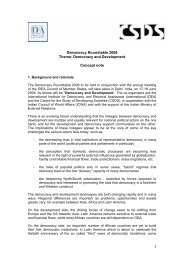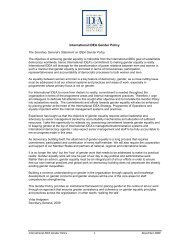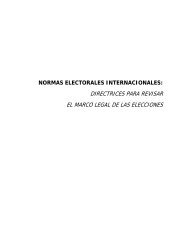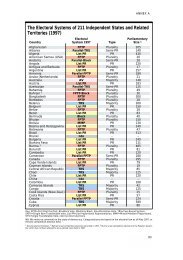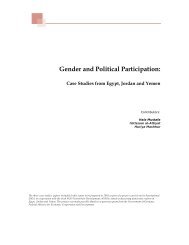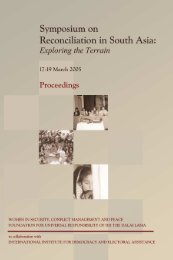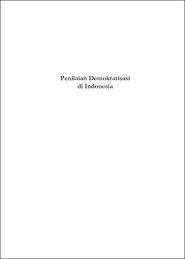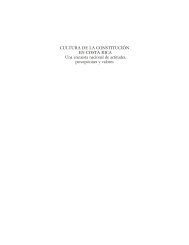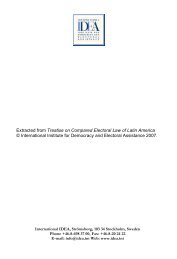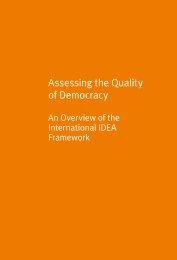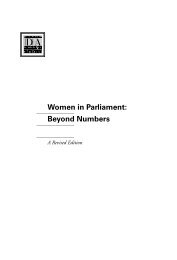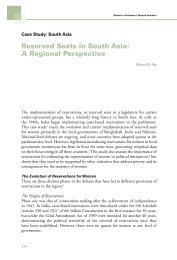The Role of State Constitutions in Protecting ... - International IDEA
The Role of State Constitutions in Protecting ... - International IDEA
The Role of State Constitutions in Protecting ... - International IDEA
Create successful ePaper yourself
Turn your PDF publications into a flip-book with our unique Google optimized e-Paper software.
now also recognize local government as well. Some parts <strong>of</strong> most <strong>State</strong><br />
<strong>Constitutions</strong> are protected from be<strong>in</strong>g changed <strong>in</strong> the same way as ord<strong>in</strong>ary law,<br />
so as to give them the status <strong>of</strong> higher law. Sometimes the special amend<strong>in</strong>g<br />
procedure requires special parliamentary majorities. Sometimes it requires the<br />
people <strong>of</strong> the <strong>State</strong>, vot<strong>in</strong>g <strong>in</strong> a referendum, to approve a proposal for change.<br />
In Australia, neither the national Constitution nor the <strong>State</strong> <strong>Constitutions</strong><br />
provide protection for rights. Partly as a result, and partly because <strong>of</strong> their age,<br />
<strong>State</strong> <strong>Constitutions</strong> tend to be rather dry documents, which do not attract much<br />
<strong>in</strong>terest or attention from the people <strong>of</strong> the <strong>State</strong>. <strong>The</strong>y thus do noth<strong>in</strong>g to<br />
enhance a sense <strong>of</strong> <strong>State</strong> political community. One lesson from the Australian<br />
experience with <strong>State</strong> <strong>Constitutions</strong> may be to treat them more seriously, as<br />
<strong>in</strong>struments that provide the fundamental law for a sub-national political<br />
community, subject only to the national Constitution.<br />
<strong>The</strong> Australian experience also raises some <strong>in</strong>terest<strong>in</strong>g questions about the<br />
relationship between <strong>State</strong> <strong>Constitutions</strong> and the national, Commonwealth<br />
Constitution.<br />
<strong>The</strong> first is the legal relationship between the two. <strong>The</strong> Commonwealth<br />
Constitution was superimposed on the exist<strong>in</strong>g colonies, which would become<br />
<strong>State</strong>s <strong>in</strong> the new federated Australia. It became the highest Australian law, with<br />
which the <strong>State</strong> <strong>Constitutions</strong> must comply. Necessarily, it took some power away<br />
from <strong>State</strong> governments, Parliaments and courts. Otherwise, however, it “saved”<br />
<strong>State</strong> <strong>Constitutions</strong>; <strong>in</strong> other words, it provided that <strong>State</strong> <strong>Constitutions</strong> should<br />
“cont<strong>in</strong>ue” unless altered <strong>in</strong> accordance with their own procedures.<br />
<strong>The</strong>re is a question about what this means for the way <strong>in</strong> which <strong>State</strong><br />
<strong>Constitutions</strong> can be changed. Of course, it means that if a <strong>State</strong> wishes to alter<br />
its own Constitution it can do so, by follow<strong>in</strong>g the alteration procedure laid down<br />
<strong>in</strong> the Constitution. <strong>The</strong> more sensitive question is whether changes to the<br />
Commonwealth Constitution can effectively change a <strong>State</strong> Constitution. <strong>The</strong><br />
answer almost certa<strong>in</strong>ly is that they can. <strong>The</strong> procedure for alteration <strong>of</strong> the<br />
Commonwealth Constitution is complex. It requires the Commonwealth<br />
Parliament to pass a bill, which must then be accepted at referendum by a<br />
national majority and by a majority <strong>of</strong> people vot<strong>in</strong>g <strong>in</strong> a majority <strong>of</strong> <strong>State</strong>s. It is<br />
therefore theoretically possible for a <strong>State</strong> Constitution to be changed by an<br />
alteration to the national Constitution that is not approved by a majority <strong>of</strong> people<br />
<strong>in</strong> the <strong>State</strong> concerned.<br />
In fact, despite this theoretical possibility, there is very little <strong>in</strong> the<br />
Commonwealth Constitution to control the structure and standard <strong>of</strong><br />
government at the <strong>State</strong> level. <strong>The</strong> real question that arises from this aspect <strong>of</strong> the<br />
Australian experience is whether this is appropriate. Most federations provide<br />
some common standards for governance <strong>in</strong> the national Constitution <strong>in</strong> relation<br />
to, for example, democracy, the rule <strong>of</strong> law and protection <strong>of</strong> <strong>in</strong>dividual and<br />
34



